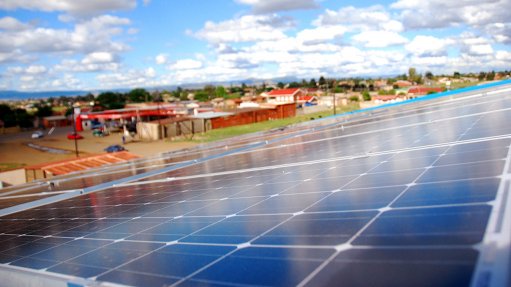
In this article, South African Photovoltaic Industry Association programme manager Niveshen Govender outlines the business case for those small firms weighing an investment in solar photovoltaic (PV) systems.
Increased demand and technological advances have contributed to the significant decrease in solar photovoltaic (PV) systems costs over the years.
A solar PV system can save small to medium businesses up to a third of their electricity costs with a payback period averaging three to eight years from installation. They can also decrease the exposure to energy price increases, as well as increase the property value for the property owner.
TECHNOLOGICAL ADVANCES
The cost of the technology is reducing on an annual basis and the trend is set to continue says Seraj Chilwan, smart grids project manager at Green Cape, a SAPVIA member and leading nonprofit organisation focused on the development of the green economy.
"What is positive to see is that we also have local businesses that have the qualifications, competencies and experience to engineer, procure and install these solar PV systems," he says. "I think a real game changer will be when battery energy storage becomes more cost-effective for businesses to invest in, so that is a technology to look out for."
However, it is important to note that some provinces such as the Northern Cape are better suited for solar PV than coastline provinces such as KwaZulu-Natal. Chilwan explains that this is because the solar irradiation levels in places like the Northern Cape are higher, which means the solar PV systems will produce more electricity than systems with lower irradiation levels.
"However, we have seen that businesses in provinces like the Western Cape, have benefited greatly from solar PV when the system is sized correctly," he explains.
THE FIRST STEP
Getting a solar PV engineering, procurement and construction (EPC) company to do due diligence on the facility is the first step in making sure that a business facility is the right candidate for solar power.
"They will be able to ascertain the solar PV system size you require, if your facility is 'roof ready' for a system, analyse your electricity bill and load profile and design and quote for a solar PV system accordingly," adds Chilwan.
SAPVIA has an accredited list of solar PV installers with PV GreenCards. The installers can be contacted for assessments and quotes.
INSTALLATION COSTS
Factors that determine costs of installation for the business include the design of the solar PV system, the value of the technology procured, professional engineering sign-off on the system and costs involved in the financing model selected. To have a good business case for solar PV, factors such as a high day-time electricity tariff, excellent operations and maintenance plans have to be considered, says Chilwan.
FINANCIAL MODELS
One of the significant obstacles businesses face is the hefty cost of installation. Besides self-funding, Chilwan explains that other financial models available to businesses looking to procure a solar PV system are available. These include debt financing from banks and the power purchase agreement (PPA) – an innovative model that the EPCs or developers offer.
Banks can provide term loans covering 70% to 100% of the capital costs within five- to ten-year loan terms. "With a PPA, the PPA provider owns the system and therefore lays out the capital to install the solar PV system; the client buys the electricity from the PPA provider at a tariff rate usually less than the current tariff the business is on. These are long-term agreements of usually 15 years and have "buy-out" clauses within the PPA," he explains.
As solar PV becomes more efficient and technology costs decrease, the business case will also improve, providing businesses more reason to consider investing in solar PV systems.